How TV shows like Superstore and The Office fill our need for the office
Advertisement
Entertainment
How TV shows similar Superstore and The Function fill our need for the part
We're turning to shows like Succession and Superstore during the pandemic for a set of working lives, says The Fiscal Times' Emma Jacobs.
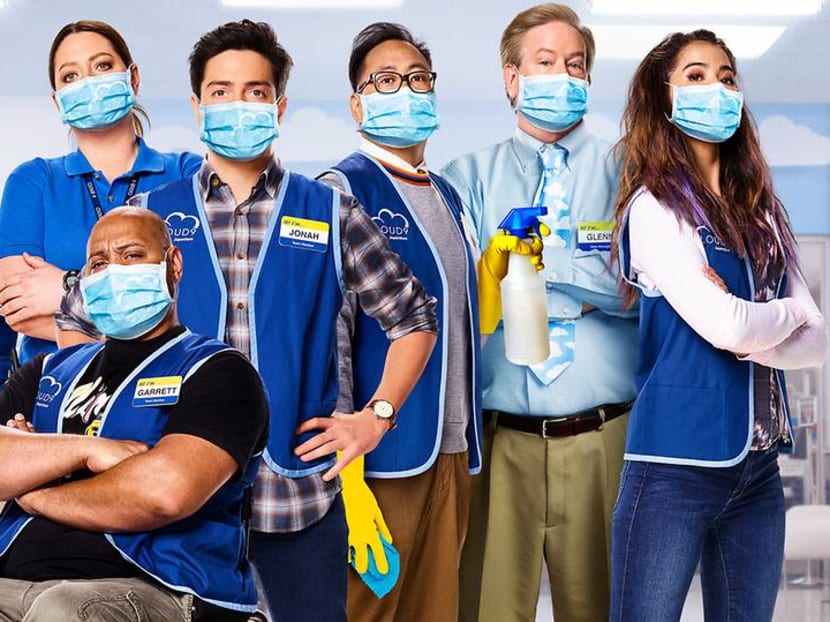
The cast of Superstore. (Photo: Superstore)
In the past year I have, like many of united states, spent far more time watching – and rewatching – dramas and comedies about the workplace than I have spent inside one.
I am inappreciably alone in doing and so. Sprawled on my sofa, which has occasionally doubled as a desk, I have observed the misfits in the basement of Abaddon Industries – a "corporate parasite that's raping land and drugging kids" – in Laura Dern and Mike White's Enlightened; rubbernecked anxious and delusional French stars at Ask, the Parisian talent agency in Telephone call My Agent!; cringed at the handling meted out to junior bankers on the trading floor in Industry; and seen retail workers get sloshed at lunchtime and go on strike at Cloud 9, the big-box retailer in Superstore.
Watching actors hold meetings, stack shelves and brand calls has triggered both relief and curiosity. After a day writing virtually offices shutting, Zoom calls and claps for carers, the workplaces I was seeing on TV seemed almost quaint.
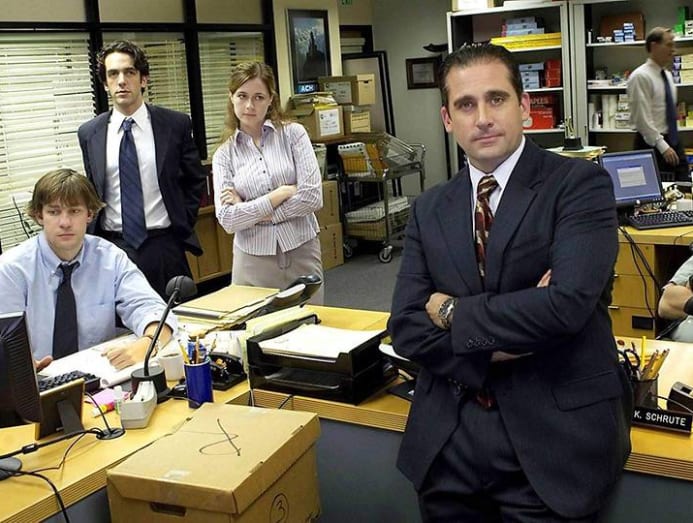
There was something peculiar and revealing almost them – like a scientist peering at a familiar object through a microscope, observing information technology in an entirely new light. At the same time, we were chip players in our own workplace shows, actualization on figurer screens in colleagues' homes through video conferencing.
These dramas and comedies were a reminder of workplace dynamics. They might focus on politics or policing, but there were universals: Hr bug, hierarchies, tensions, mentors. Although I was starved of company beyond my family, it would be overegging it to say the shows fabricated me nostalgic for the camaraderie of the bottle. Yet watching workers do their jobs made me yearn for the delight of unexpected conversations, the glamour of clean, smart(ish) apparel and a stationery cupboard.
Workplaces are attractive to programme makers. There is, after all, no demand to explain the logic of bringing disparate people together in an role, estate agent'due south or store.
Justin Spitzer, a writer and producer on the U.s.a. version of The Function and Superstore's creator, explained the entreatment over electronic mail: "In a workplace, it'south a bunch of people from unlike backgrounds, who might not remotely like each other, forced to spend most of their day together".
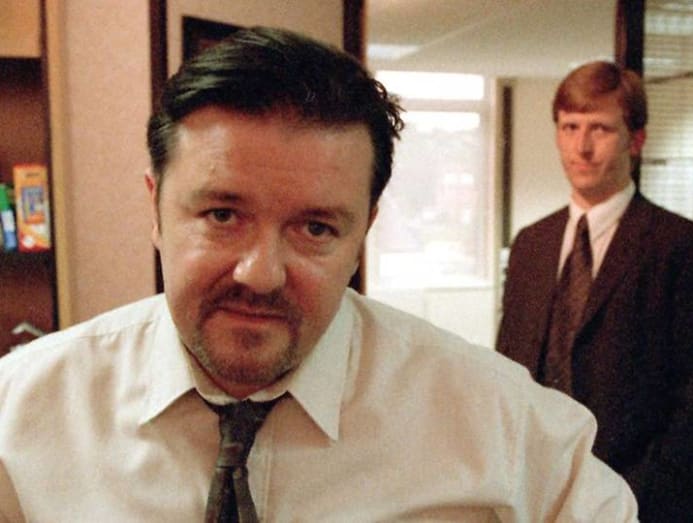
Jamie Demetriou, creator and co-writer of the Channel 4 comedy Stath Lets Flats, who also stars as the testify's eponymous inept Greek-Cypriot n London estate agent, said: "For a lot of people, their task does not reflect their passion. Every bit a upshot, you don't get people who are agreeing". This smorgasbord of personalities is compelling to writers, he added: "Ultimately, you want to have a multifariousness of characters who have friction."
Workplace dramas are not, of course, about day-to-day tasks that characters happen to be performing – the tedium of email ping-pong or pricing cereal packets – but, rather, the human being condition. For insights, I spoke to Lucy Prebble, who has depicted the working globe in stage plays such as Enron and as a author for the ongoing HBO series Succession.
There are some jobs that viewers find inherently interesting, she suggested – for case sex work, the field of study of her ITV accommodation Hush-hush Diary Of A Call Girl, "just fifty-fifty that becomes pretty dull unless you're telling a person's character story within it".
In Succession, which depicts the barbarous infighting at Waystar RoyCo, a media empire run past a family unit with teasing similarities to the Murdochs, Prebble insisted information technology is the characters that drive the story.
"By the time a company gets to exist the size of Waystar, it's more than about 'coin' or 'business organisation' than a detail product," she said. "Piece of work like this is really just interesting when in that location are graphic symbol or relationship dynamics being played out underneath."
Perhaps then. But for this viewer at least there is as well delight in the settings: The corporate trip to a Hungarian castle; or when Roman, the wayward youngest son, swaps his smart suits and glistening headquarters for management training that requires him to rub along with employees at an amusement park while wearing a turkey costume.
Or the ugliness of hierarchy when an agile shooter enters the part and Roman's brother-in-police Tom pushes people aside to get to the panic room, shouting: "Executives coming through".
The high toll of work on love and life runs through the four series of French comedy Call My Agent!. While the piece of work seems seductive – glamorous, artistic and full of intrigue – there are costs: High-maintenance clients, workplace politics, messy relationships, scant downtime.
As the testify heads to a finale, we wonder whether Andrea Martel, the hyper-driven agent who picks up work calls minutes after giving birth, might opt for some other path in life – as many of us have contemplated in the pandemic.
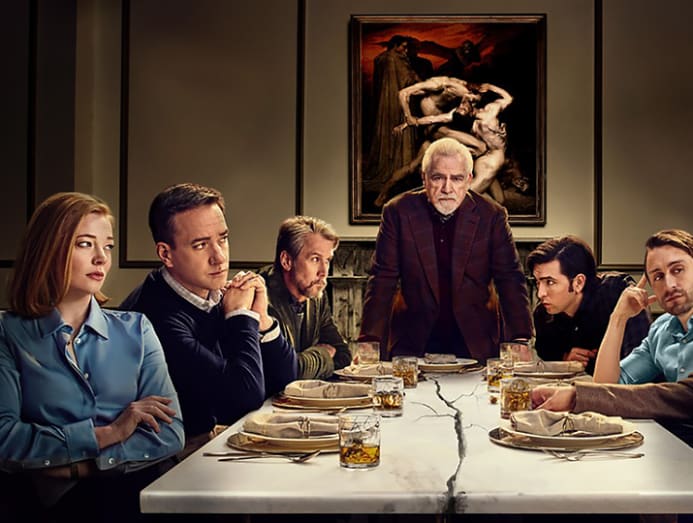
While working from domicile is monotonous for many, it's not as if most concrete workplaces lack boredom. Joe Moran, author of Armchair Nation: An Intimate History Of Britain In Forepart Of The Television receiver, cited shots in the original British The Role depicting workers yawning or feeding paper into shredders, and the surreal management-speak and status games of the BBC'south W1A, set in an exaggerated version (perhaps non too exaggerated) of the corporation itself. "One-act can portray piece of work'southward essential absurdity," he said.
In the early 2000s, a decade before the anthropologist David Graeber popularised the term "bullshit jobs", The Role was exploring this territory. "Near of united states," said Spitzer, "can identify with hard co-workers and bosses who give mandates we don't agree with."
We who are watching lap information technology up. Whenever I feel unappreciated past my employer, it is not a career coach or book I turn to, just Mad Men. In ane scene, the advertising creative managing director Don Draper lashes out at copywriter Peggy when she complains that he has won an award for a campaign she worked on. Don: "It's your task! I give y'all coin, you lot give me ideas." Peggy: "And you never say cheers." Don: "That's what the money's for!"
Some may run into this as a reminder that bosses can be tyrannical jerks. I am more sympathetic towards Don: At work, sometimes the best strategy is to stop whining and pull yourself together.
The question, of course, is what TV writers and producers will make of the strange working world then many of the states at present inhabit. There are a few signs, here and there: Superstore's most contempo serial, filmed last autumn, depicts shop workers with face masks, frozen Zoom calls and social distancing. When management fails to supply sufficient PPE, one retail worker says: "You gotta expect at it from corporate's perspective. They love money, and they don't care if we die".
Prebble has also recently been on fix for the latest serial of Succession, filming in offices emptied past the pandemic – a topsy-turvy experience, she said. "We hire spaces that are at present unused . . . to perform a ritual of working in them that humans used to practise, and and then record that for cursory, brilliant moments of what life used to be like."
The actors were the simply ones allowed to unmask and touch each other, while the rest of the coiffure stood by, wearing heavy PPE, "then we can later safely transmit these moments to other, separated humans and help them feel distracted from their circumstances and less alone".
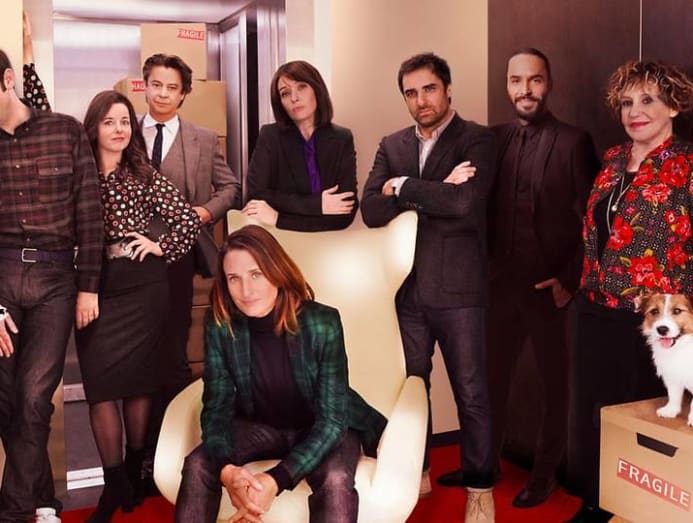
There accept been experiments with Zoom – notably the BBC's Staged, which portrayed actors Michael Sheen and David Tennant playing fictionalised versions of themselves, attempting to prepare for a play over video conference, while also chatting nearly home life and career paranoia (all of information technology filmed over video briefing). Still other TV writers take constitute it hard to adapt. Cut off from the earth, it's hard to find inspiration for material, said Demetriou: "You don't realise how influenced y'all are past the conversations you have every day".
Konrad Kay, who created and wrote Industry with Mickey Down, said that when the show aired at the terminate of last year, viewers told him that seeing people at restaurants and parties made them nostalgic, something the writers had patently never planned: "It made people miss the office".
Will viewers want to binge on programmes featuring face up-masked and socially distanced actors? If the pandemic permanently overhauls our working lives, how will that be reflected on screen? Shows about estate agents, police officers and medics are unlikely to need to modify their depictions of the workplace – though presumably masks would feature. However writers who focus on white-collar piece of work may have to grapple with what seems likely to be a hybrid future, split betwixt home, co-working spaces and the office.
Down, who is deep into the 2nd series of Industry, said: "If you're writing a workplace drama and it's set mail-2020, it wouldn't be sensible to [avoid the biggest] shock to workplaces in 100 years: You have to admit information technology. The difficulty is nosotros don't know how it will bear on work in the long term."
Kay does not expect the finance globe – the focus of Industry – to alter hugely, pointing out that his one-time colleagues in investment banking are already back at the office. "With some concessions – that is, more than spread out, some desks going unoccupied – it seems to exist business every bit usual, at least at the one identify we know of first paw."
Spitzer is working on a new bear witness, American Motorcar, virtually executives at a big motorcar visitor based in Detroit. Though it's possible the programme makers will include some hybrid-working scenes, they'd rather non, he said.
"We're not thinking of this equally a world in which the pandemic didn't happen, but we're also non dealing with information technology in any substantive style. Past the time this airs, hopefully we'll be trying to put COVID behind the states." They're proceeding on the basis that the workplace of 2022 won't be that different to the 1 of 2019, he said: "If that's not the case, we'll adjust from there."
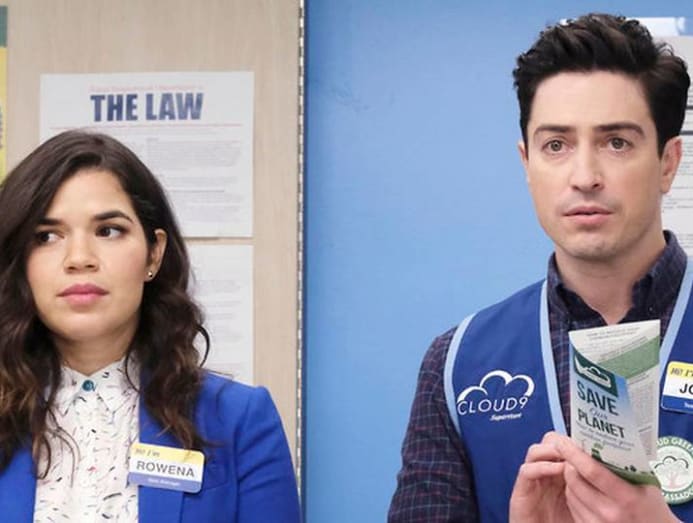
How virtually working-from-domicile or hybrid-working storylines? "Anything that tin can happen in a workplace presents an opportunity to exercise a story near it," he said.
The strangeness of the period we're in right now, both interminably slow and hyper-fast, is that shows currently being made may, in a yr's time, look as primitive every bit Mad Men'due south 1960s. Will there be masks? Will we still exist socially distanced or cramming once again into lifts and canteens? Will vaccines exist the hot topic around the water cooler?
I am hopeful that a hybrid future will provide fresh comedic and dramatic material – the disharmonize between personal and piece of work life may even become more sharply drawn at habitation. And like cockroaches in the apocalypse, office politics will surely survive at a distance – perhaps thrive. Rather than covert conversations in the corner of a meeting room, white-collar workers may have to see like cold state of war spies on park benches to practice each other in.
And I feel sure the office will remain in some shape, providing a stage for our personal dramas, politicking, rivalry and idiocy. Strange though it may sound, I tin't await to see the time to come of work play out on my telly.
By Emma Jacobs © 2022 The Financial Times

0 Response to "How TV shows like Superstore and The Office fill our need for the office"
Post a Comment